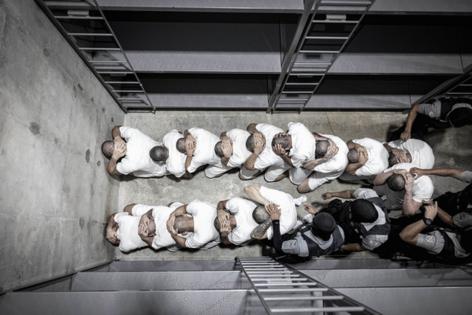Federal judge rules Trump can't use archaic law to deport Venezuelan gang members
Published in News & Features
A federal judge in Texas ruled on Thursday that the Trump administration cannot use an 18th Century law — meant to be deployed against members of a hostile foreign nation during a declared war or military invasion — as a basis to deport undocumented immigrants in the U.S. who supposedly belong to a violent Venezuelan gang known as Tren de Aragua.
The judge’s ruling permanently prohibits the Department of Homeland Security from removing immigrants detained under the 1798 Alien Enemies Act in the Southern District of Texas, which includes Houston. His decision represents a major setback for the Trump administration’s effort to deport suspected members of the Venezuelan gang under the archaic law to a notorious mega prison in El Salvador.
U.S. District Judge Fernando Rodriguez Jr. found that the “plain ordinary meaning” of the act’s language, like “invasion” and “predatory incursion” by “military forces,” does not jibe with President Donald Trump’s claims about the activities of Tren de Aragua in a March 14 proclamation invoking the Alien Enemies Act. Trump declared that gang members must be booted out of the country because they were “conducting irregular warfare” against the United States at the direction of Venezuela’s leader, Nicolas Maduro.
“The court concludes that as a matter of law, the executive branch cannot rely on the A.E.A., based on the proclamation, to detain the named petitioners and the certified class, or to remove them from the country,” the judge wrote in a 36-page order, which included a permanent injunction against deportations under the act.
The Justice Department is expected to appeal the ruling by Rodriguez, who was appointed to the federal bench by Trump during his first term as president. In its aggressive targeting of illegal immigrants, the Trump administration has zeroed in on the Venezuelan gang members by invoking the 1798 act, which had only been invoked three times in the nation’s history: during the War of 1812 and World Wars I and II.
The American Civil Liberties Union has so far filed at least eight lawsuits challenging the Alien Enemies Act in Texas, New York, Colorado, Pennsylvania, Nevada, Washington and Georgia. Federal judges in six of those cases have issued provisional orders stopping the administration from using it to expel Venezuelans accused of belonging to Tren de Aragua to the prison in El Salvador.
Last month, Rodriguez issued a restraining order that stopped the administration from using the wartime powers act to deport any Venezuelans held at a detention facility near the southern border. His ruling came in the case of three Venezuelans who filed suit to halt their deportations to the Salvador prison. Initially, they had brought their lawsuit along with two other New York detainees in the District of Columbia.
They sought judicial review after the Trump administration in mid-March flew about 140 Venezuelans that it accused of belonging to the Tren de Aragua to the Terrorism Confinement Center in El Salvador as part of a deal it had brokered with the country’s leader, Nayib Bukele.
But a federal judge In Washington, James Boasberg, put future removals of the Venezuelans on hold to determine whether they were subject to the Alien Enemies Act. The Justice Department persuaded the Supreme Court to lift the stay imposed by Boasberg, an appointee of President George W. Bush.
In a split 5-4 vote, the high court ruled the Trump administration could continue the deportations under the wartime powers law, but that the Venezuelan immigrants must first be allowed to challenge their removals on an individual basis by filing habeas corpus petitions in federal court in Texas. While Trump declared victory over the Supreme Court’s decision, lawyers at the American Civil Liberties Union representing the Venezuelans also touted the court’s decision as a triumph.
Meanwhile, lawyers for the Trump administration acknowledged in a separate case involving a challenge to the Alien Enemies Act that immigration authorities mistakenly deported a Maryland man to the mega prison in El Salvador along with members of Tren de Aragua. Despite the admission of an “administrative error,” the lawyers said the government lacked the authority to return him to the United States.
In Maryland, U.S. District Judge Paula Xinis ordered immigration authorities to bring back the man, Kilmar Armando Abrego Garcia. The Supreme Court upheld her decision, ruling that the Trump administration must “facilitate” Abrego Garcia’s return from the Salvadoran prison. But since the high court’s ruling, Trump and senior officials have not taken steps to bring him back to the United States.
Abrego Garcia, who at one time was accused by a government confidential source of being a member of the Salvadoran gang MS-13, was allowed to stay in the United States in 2019 after an immigration judge stopped his removal order to El Salvador.
But in March, Abrego Garcia, whose wife is a U.S. citizen, was stopped by Immigration and Customs Enforcement officers who “informed him that his immigration status had changed,” according to his attorneys.
Abrego Garcia, the father of a 5-year-old son, was detained and then transferred to Texas before being sent to El Salvador.
The Miami Herald and other outlets have published stories showing many of the Venezuelans sent to El Salvador do not appear to have criminal records in the United States or elsewhere. One CBS investigation found three-quarters of the men seemed to lack any criminal history anywhere.
_____
©2025 Miami Herald. Visit miamiherald.com. Distributed by Tribune Content Agency, LLC.







Comments